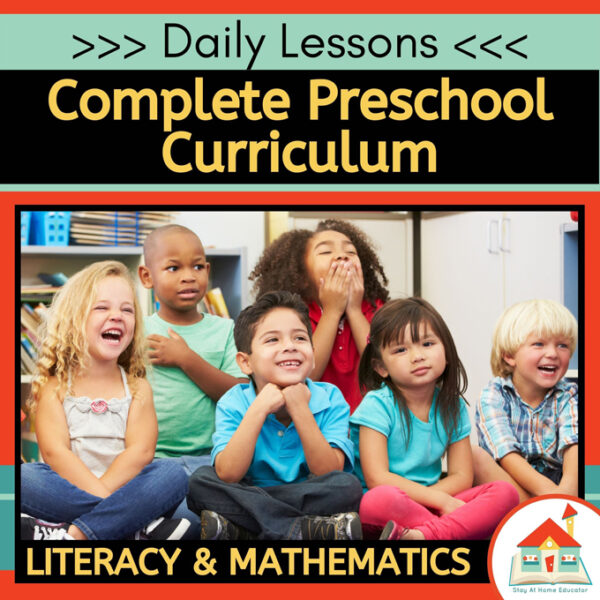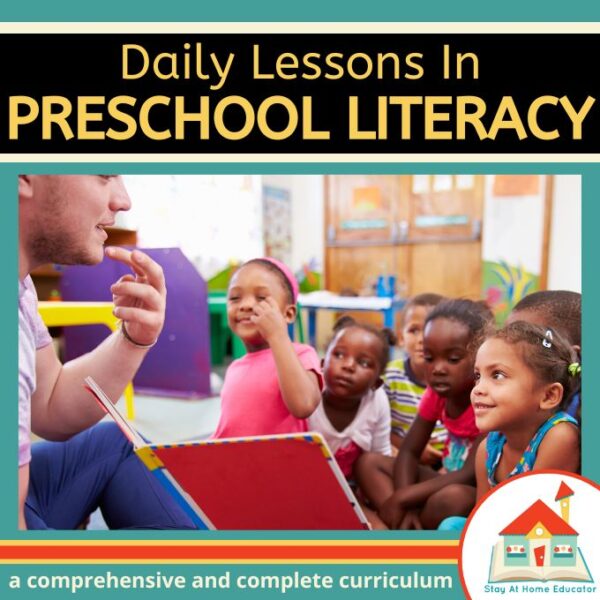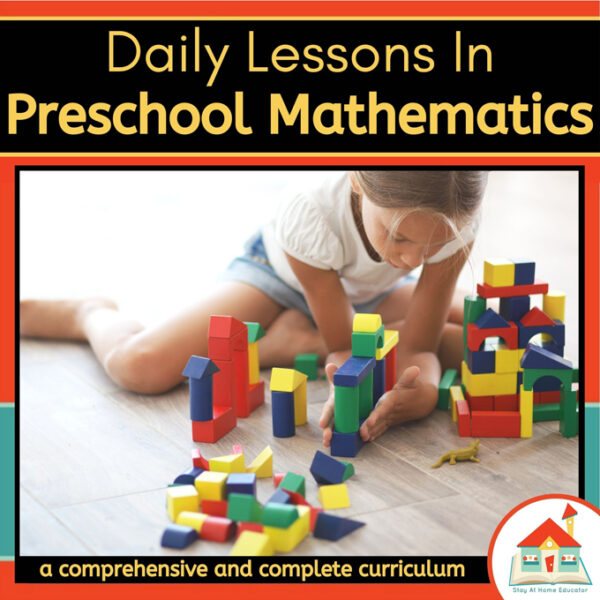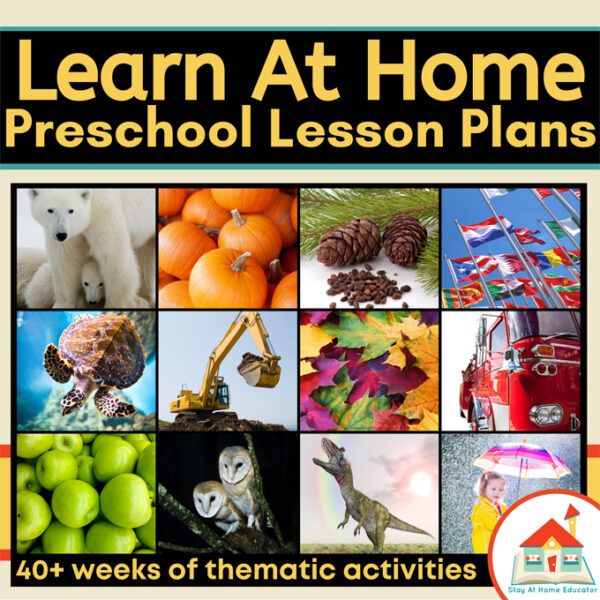If you’ve decided to homeschool preschool, like so many parents do, you might be wondering how to get started in putting together a preschool at home curriculum. If you’re feeling a sense of overwhelm and confusion, you’ve come to the right place. This post will lay out the brass tacks of what should be included in your preschooler’s learning at home.
The Brass Tacks of a Preschool At Home Curriculum
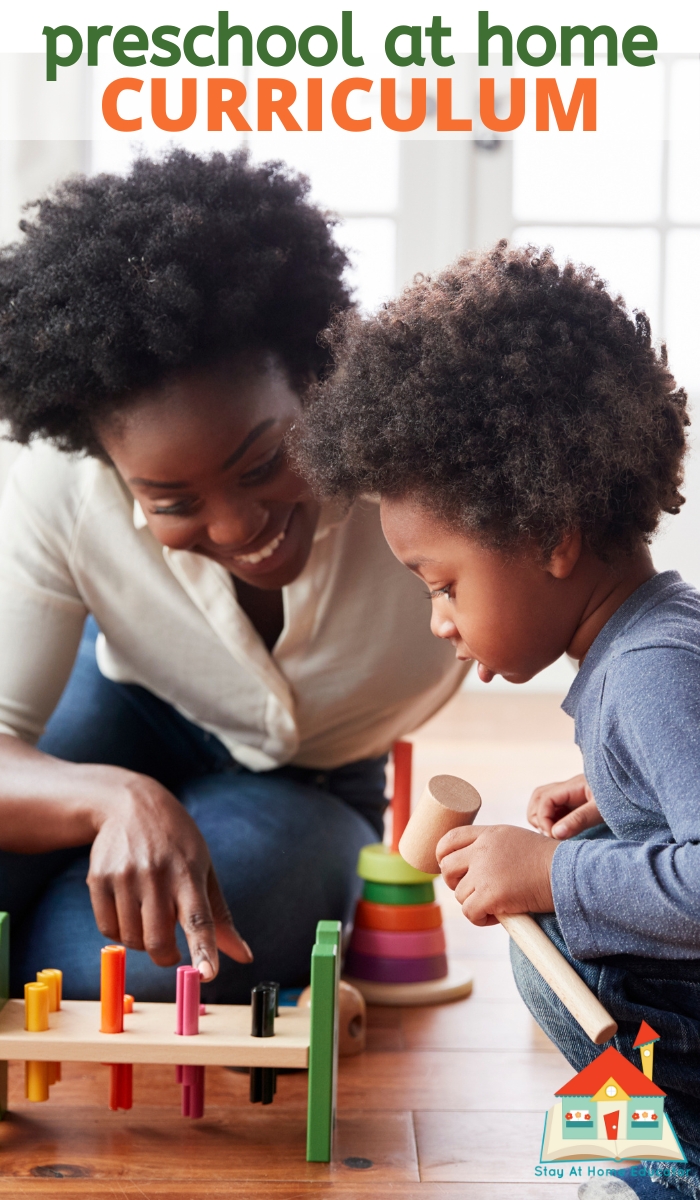
Preschool is all about academic readiness, and that holds true for homeschool preschool.
The overarching goal for any preschool setting is to provide our preschoolers with learning activities that allow and encourage important academic and life skills to develop. The hope is that these essential skills will carry over from early childhood into a formal school setting in the older years, making them successful and life-long learners.
Choosing the right learn at home preschool program is important, since learning experiences shouldn't be limited to simply learning the letters or the alphabet or shapes and colors. The preschool years should include learning under the following domains:
- social skills
- approaches toward learning
- physical well-being and motor development
- cognition and general knowledge
- language and literacy
- mathematics
When these preschool learning domains are interwoven through thoughtful preschool activities, they create a dynamic educator for young children.
A Word About the Importance of Play
Play is the secret ingredient to unlocking your child's potential in their early years. Believe it or not, play is the most effective way for children to learn and grow.
But what does play-based learning actually look like? (Hint: it's not letting your child play all day without supervision or interaction). How can you create a home environment that fosters both fun and intellectual development?
With a little creativity and intentionality, you can turn any activity into a learning opportunity. Whether it's stacking blocks or playing dress-up, every moment of play can help your child develop important skills like problem-solving, creativity, and emotional intelligence.
Playful learning should definitely be a part of any preschool at home curriculum.
Play Based Learning Curriculum for Home
Play Based vs. Academic Learning
More About the Domains of Learning in Preschool
Now that we have covered on a surface level what kinds of content should be included in a learn at home preschool curriculum, let's take a deeper look into what is included in each learning domain.
Having a solid understanding of each learning domain will help ensure your preschooler is getting just the right learning activities during their homeschool preschool time with you.
Each learning domain is broken down into strands. Following each stand you will find individual skill development ideas.
Social Skills
Social skills is listed first because it is one of the most important skill sets for preschool aged children to learn. This is where children learn about emotions and human nature and develop the language skills they need to interact and communicate their needs and feelings.
Strand: Concepts of Self
- awareness and expression of emotions
- individuality and belongiing
- self comforting
- self regulation
- sense of competence
- attachment
- interaction with adults and peers
- empathy
Example Social Skills Development Ideas
- shows awareness of and is responsive to emotions
- demonstrates control over emotions
- can identify feelings, needs, and interests
- can self comfort
- responds positively to limits and choices
- seeks assistance
- responds in caring ways to another's distress

Approaches Toward Learning
This preschool learning domain is all about how children learn. It refers to the skills children use and behaviors they exhibit to engage them in learning. This is where children a gauged on their initiative, attention during activities, and creative thinking and processes.
Strand: Initiative
- curiosity
- planning
- action
- reflection
Example Initiative Development Ideas
- is enthusiastic to leanr new skills
- willingness to try new activities
- approaches tasks with repeated trial and error
- approaches toward learning
- physical well-being and motor development
- cognition and general knowledge
- language and literacy
- mathematics
Strand: Engage and Persistence
- attention to activities
- persistence
Example Engage and Persistence Development Ideas
- can focus on activities, but with some distraction
- attempts to reproduce positive outcomes
- repeats activities with interesting affects
Strand: Creativity
- innovation
- invention
- expression of ideas and feelings through play
- expression of ideas and feelings through art
Example Creativity Development Ideas
- engages in self-initiated activities for extended periods
- demonstrates satisfaction or dissatisfaction when working with various materials
- uses imagination in play
- engages in dramatic play with peers
Physical Well-Being and Motor Development
During early childhood, the human body changes continuously and dramatically. This is not simply changes in height and weight, but also includes intricate changes in body composition, proportion, and motor development. In this domain, preschoolers learn to have control over their bodies as well as a better awareness of their bodies.
Strand: Motor Development
- balance
- coordination
- grasp and reach
- oral motor skills
- sensory input
Example Motor Development Ideas
- demonstrates strength
- executes purposeful movements
- shows increased coordination and balance
- uses sensory information to guide movement
- engages in a variety of sensory play
Strand: Physical Well-Being
- body awareness
- physical activity
- nutrition
- self help skills
- safety skills
Example Physical well-Being Development Ideas
- shows awareness of body
- enjoys and participates in physical activity
- expresses hunger and thurst
- puts on own pants, coat, and shoes
- follows adult guidance in regards to safety

Cognition and General Knowledge
The early childhood years encompasses significant brain development, including the emergence of language and thinking skills. At birth, a child's brain is only 30% developed, whereas by age five it is over 90% developed (Shonkoff & Phillips, 2000). This time for growth creates a unique opportunity for rich and dynamic learning.
Strand: Cognitive Skills
- memory
- symbolic thought
- reasoning
- problem solving
Example Cognitive Development Ideas
- repeats things seen at an earlier time
- anticipates the beginning and ending of activities, songs, and stories
- engages in pretend play involving a sequence of steps
- assigns roles in dramatic play
- uses strategies to problem solve
Language and literacy are closely intertwined as they are both modes of communication. This allows children to participate in a broad range of daily activities.
As young children navigate the complex world of language and literacy, the support of parents, primary caregivers, and teachers is paramount. By providing opportunities for children to interact with language and read text-rich materials, they can help set these young learners on a path toward success in communication and academic achievement.
The language and literacy preschool learning domain also encompasses the components of early reading, which are:
Strand: Listening and Speaking
- receptive language
- comprehension
- expressive language
- social communication
Example Listening and Speaking Development Ideas
- responds to sounds
- understands simple requests
- uses gestures in combination with words to express wants and needs
- initiates basic conversation
- attempts to use new or unfamiliar words
Strand: Reading Readiness
- interest in books
- reading comprehension
- print concepts
- phonological awareness
- early writing
Example Reading Readiness Development Ideas
- actively participates in stories and singing
- points to famliar pictures in books
- identifies cover of book
- vocalizes sounds after modeling
- recognizes own name
- uses pincer grasp or quadrapod grasp
- makes written symbols on paper to convey ideas
Mathematics
Did you know that preschool and toddler aged children are constantly engaged in mathematical skills through their playtime? From sorting and organizing to building and designing, these natural interests spark the beginning development of math skills.
As educators or parents, it is important to also incorporate purposeful preschool math activities into lesson plans to further enhance their learning.
There are five disciplines of math, which are:
- number sense
- algebra
- geometry
- measurement
- data analysis and probability
These five disciplines can be further divided into the following preschool math units:
- Comparing & Sorting
- Counting 0-5
- Shapes
- Counting 0-10
- Positions & Patterns
- Counting 0-20
- Measurement
- Graphing
- Addition & Subtraction
Strand: General Mathematics
- understands and represents quantities
- compares small quantities
- identifies differences among objects and people
- can match pictures or items
- shows awareness of size
- uses size differentiation words
- explores how objects fit together
- identifies shapes and colors
How to Lesson Plans for Pre K
This comprehensive guide to pre-K lesson planning will delve into the importance of preschool lesson plans, offer useful advice on how to construct them, and highlight a variety of top-tier lesson plans tailored to meet your specific requirements.
Learn At home Preschool Lesson Plan Ideas
If you're looking for preschool themes to keep your preschooler interested at home, these Learn At Home Preschool Lesson Plans will keep learning fun!
The Learn at Home Preschool Lesson Plans are free lesson plans you can use to teach your preschooler at home.
All the preschool learning activities are quick and easy to set up, designed to save time, requiring hardly any (if any at all) prep and only requires the most basic of household materials. This makes them especially easy for parents to implement...and this makes preschool teachers especially happy, too!
Just glance over the lessons each day, gather the very few materials needed, and you’re ready to go!
But don’t be fooled by the name “at home” preschool lesson plans! These activities work wonderfully in the classroom as well, and if you’re a preschool teacher who is remotely teaching you can send these lesson plans to your student’s parents.

I’m Sarah, an educator turned stay-at-home-mama of five! I’m the owner and creator of Stay At Home Educator, a website about intentional teaching and purposeful learning in the early childhood years. I’ve taught a range of levels, from preschool to college and a little bit of everything in between. Right now my focus is teaching my children and running a preschool from my home. Credentials include: Bachelors in Art, Masters in Curriculum and Instruction.
